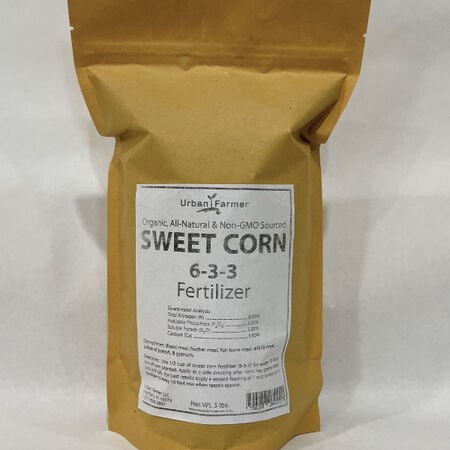Organic Sweet Corn Fertilizer, Fertilizers
Organic, All-Natural & Non-GMO Sourced Sweet Corn Fertilizer (6-3-3)!
The Urban Farmer Sweet Corn Fertilizer will increase corn yields, size, health and taste. This 6-3-3 (NPK) fertilizer ratio is specially formulated to get the most out of your corn. This fertilizer gives the corn exactly what it needs at the right time. Sweet Corn fertilizer also contains several other beneficial vitamins, minerals and microbes for improving soil health.
Directions: Use 1/2 cup of sweet corn fertilizer (6-3-3) for every 10 foot row of corn planted. Initially apply after corn has germinated and is 6" tall. For best results apply a second feeding of 1 cup sweet corn fertilizer to every 10 foot row when tassels appear. 1 pound will feed 15 foot row of corn for an entire season.
How much sweet corn fertilizer do I need? 45' Row of Corn (70 corn stalks): 3 lbs 90' Row of Corn (140 corn stalks): 6 lbs 360' Row of Corn (560 corn stalks): 24 lbs
Derived from: Blood Meal, Fish Bone Meal, Alfalfa Meal, Sulfate of Potash, Feather Meal and Gypsum. Guaranteed Analysis: Total Nitrogen (N) ..................... 6.00% Available Phosphate (P2O5)..... 3.00% Soluble Potash (K2O) ............... 6.00% Calcium (Ca) ............................. 9.30% Sulfur (S) ................................... 5.00%
Product Details
Weight
25Depth
9Height
24Width
6Components
Growing Instructions
Shipping Schedule
Our Seed Promise
 "Agriculture and seeds" provide the basis upon which our lives depend. We must protect this foundation as a safe and genetically stable source for future generations. For the benefit of all farmers, gardeners and consumers who want an alternative, we pledge that we do not knowingly buy or sell genetically engineered seeds or plants.
"Agriculture and seeds" provide the basis upon which our lives depend. We must protect this foundation as a safe and genetically stable source for future generations. For the benefit of all farmers, gardeners and consumers who want an alternative, we pledge that we do not knowingly buy or sell genetically engineered seeds or plants.
The mechanical transfer of genetic material outside of natural reproductive methods and between genera, families or kingdoms, poses great biological risks as well as economic, political, and cultural threats. We feel that genetically engineered varieties have been insufficiently tested prior to public release. More research and testing is necessary to further assess the potential risks of genetically engineered seeds. Further, we wish to support agricultural progress that leads to healthier soils, to genetically diverse agricultural ecosystems, and ultimately to healthy people and communities.
To learn more about the "Safe Seed Pledge" please visit www.councilforresponsiblegenetics.org.

